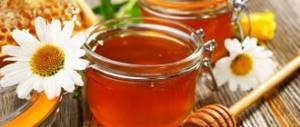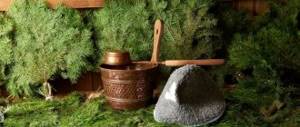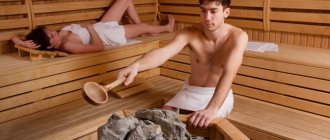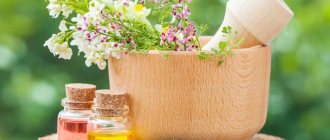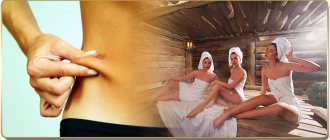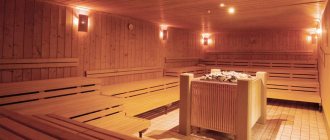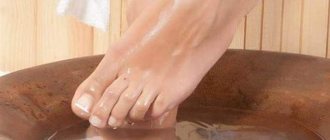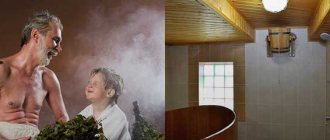- Date December 29, 2014
- Author Ekaterina
- Category Health, Beauty
Finally managed to get out to the bathhouse or sauna? Everyone knows that this is good for the body, the nerves are calmed, stress is relieved, the functioning of the kidneys, heart, and various glands is normalized. Regular visits to baths and saunas strengthen the immune system and promote weight loss, which is especially important for women. It is useful for children to steam for the prevention of respiratory diseases and for hardening.
However, do not forget that a bath with a sauna also has contraindications for certain categories of people suffering from certain ailments and diseases.
Is it possible to visit the bathhouse after a long feast?
Often after noisy events (corporate parties, birthday celebrations), many continue the fun in the bathhouse. Sometimes people deliberately do this, citing the fact that the steam room expels alcohol from the body in a matter of minutes. I will say right away that doctors do not recommend taking alcohol before a bath and steaming while intoxicated.
The reasons are as follows:
- In the first hours, the effects of alcohol and hot steam on blood vessels coincide - muscle relaxation and vasodilation occur;
- The heartbeat reflexively increases;
- Blood supply to the brain decreases.
As a result, blood accumulates in the peripheral capillary bed. The brain experiences oxygen starvation, which leads to loss of consciousness and fainting. There is an opinion that a good snack slows down the absorption of alcohol, but after eating the volume of the vascular bed of the stomach increases, this increases theft of the brain. Therefore, you should not drink alcohol before the bath, and doctors also advise you to refrain from a heavy snack.
Healing drinks after the steam room
Modern synthesized medicines will never compare in their medicinal properties with natural herbal tinctures and other medicines obtained from medicinal plants. They can also be drunk after paired procedures, but only on the recommendation of the attending physician. Depending on the existing health problems, the specialist will prescribe a certain type of medicinal drink.
- Diabetic drink. For people suffering from diabetes, teas with a sugar-lowering effect are suitable. To do this, you need to mix blueberry leaves, flax seeds, chopped bean pods and green oat straw in equal proportions. If you take 2 grams of each ingredient, then the resulting mixture should be poured with two liters of boiling water.
- Diuretic drink. To brew it, you need to take 5 g of dried St. John's wort, black currant leaves and sainfoin herb. Pour one glass of boiling water over everything. It is better to steep the tea in a small teapot for 10 minutes.
- Diaphoretic drink. You need to mix dried raspberries and linden inflorescences in equal proportions. Pour 2 cups boiling water over 2 tbsp. spoons of the prepared mixture in a separate bowl and cover it with a lid. The medicinal drink is brewed in 5 minutes.
- Cough infusion. Tea from coltsfoot, plantain and licorice root, which are taken in parts 4:3:3, respectively, promotes the removal of phlegm, improving not only a person’s breathing, but also his general condition. After mixing all the ingredients, you need to take 1 tbsp. spoon of the dry mixture and pour two cups of boiling water. Infuse tea for 30 minutes.
- Choleretic drink. To brew this tea you will need trefoil, coriander seeds, mint and immortelle flowers - in proportions 3:2:2:4, respectively. Pour one tablespoon of the mixture into one glass of boiling water, allowing the drink to brew for 20 minutes.
Since visiting the steam room is not only a fat-burning procedure, but also a process in which moisture is removed from the body, a person needs to gradually restore his water balance with the help of medicinal liquids. But doctors recommend not to get carried away with drinking tea or any other drink. If you are in the bathhouse for about two hours, then it is enough to drink two or three glasses of liquid, but in several sittings. There are also special recipes for fruits, vegetables and other drinks that are good to drink after a steam room.
Even the most necessary decoctions, fruit drinks, juices, etc. for health should be consumed in a bathhouse in reasonable doses and at the right time. After all, only following all the rules of drinking tea during breaks and after steam procedures will help in cleansing and rejuvenating the entire body. Then the process will be not only pleasant, but also useful.
Is a bottle useful in a bath?
Traditionally, it is not recommended to bring alcohol into the sauna. Alcohol intoxication in a sauna leads to dangerous and sometimes fatal consequences:
- Firstly, dilation of brain vessels due to overheating can lead to rupture of the vessel and cause hemorrhage in the brain.
- Secondly, the sharp temperature change that occurs when doused with cold water after a sauna leads to vasoconstriction. Such actions can lead to the detachment of a blood clot and cause sudden death from arterial thromboembolism, heart attack or stroke.
- Thirdly, increased evaporation of vapors from the respiratory tract increases the concentration of alcohol breakdown products (fumes) in the air, causing repeated toxic effects.
- Fourthly, alcohol increases the load on the heart: heartbeat increases, shortness of breath appears.
- Fifthly, injuries in the bathhouse due to intoxication lead to fractures, dislocations and head injuries.
Now let's figure out how alcohol affects vital systems. In a sauna environment, the influence has its own characteristics.
How to make decoctions and infusions correctly
In order to prepare a healthy drink, it is important to know what specific healing properties a particular plant has. For example, linden helps cure colds, mint has a beneficial effect on the cardiovascular system, and thyme and lavender are useful for respiratory diseases. All herbs that will be used for decoctions and infusions must be well dried and stored properly.
Having decided on the ingredients, you can start preparing the decoction. If you are interested in storing it for a long time, use this method. Take 100 g of dry crushed herb (any one of your choice) and fill it with 4 liters of water. You need to boil the broth and cook over low heat for 5 minutes. Then turn off the stove and let it cool completely. The cooled broth should be strained through cheesecloth and poured into glass bottles. Thus, it can be stored for quite a long time.
In addition, to prepare an infusion that is good to use in a steam room, you can use plants such as:
- hawthorn;
- sage;
- eucalyptus leaves;
- coltsfoot;
- motherwort;
- juniper;
- Birch buds.
Infusions for aroma in the bath are considered very useful. They not only create a pleasant atmosphere, but also have a beneficial effect on the human body. Coniferous infusions or potions with hop cones have a tonic effect, help with colds, and also strengthen the immune system. To prepare, you need to chop spruce branches and pour 5 liters of boiling water over them.
The infusion should stand under the lid, wrapped in a towel, for 30 minutes.
When preparing a prefabricated infusion for use in a bathhouse, all components must be combined in equal proportions. Depending on the plant chosen, the steaming time will vary. But no matter what recipe you choose, a visit to the steam room will charge you with energy and vigor for the whole week.
Effect on the urinary system
The liquid in the steam room is released from the body along with sweat through enlarged pores. The kidneys temporarily stop producing urine. The product of ethyl alcohol processing (ethyl aldehyde) is not excreted, but accumulates in the blood, causing a toxic effect: headache and vomiting.
All of the above also applies to such a seemingly harmless drink as beer. This is due to the following reasons:
- Beer contains ethyl alcohol;
- The small percentage of alcohol is compensated by the impressive volumes consumed;
- Beer together with high temperature causes functional disorders and flatulence.
Therefore, when going to the bathhouse, I will think carefully: do I need alcohol in the bathhouse, is it worth spoiling my impression of the holiday and harming my health.
Consequences of drinking beer before a bath
Scientists studying the problems of alcoholism do not consider beer a harmless drink. Professor Bohlinger (Germany) has established a direct relationship between heart disease and beer abuse. If you drink beer in a bathhouse, the following processes occur:
- Cobalt is used to stabilize beer foam. After drinking a glass of foamy drink, the heart muscle receives a portion of a toxic element that exceeds the established norm by 10 times.
- A drink saturated with carbon dioxide quickly fills the blood vessels, disrupts blood flow, and causes dilation of the veins of the lower extremities.
- The heart increases in size and arrhythmia occurs, negatively affecting the hepatic artery. These injuries are especially life-threatening.
- After research, cardiologist at the Mayo Clinic (USA) Virend Somers concluded: even a moderate dose of alcohol lowers blood pressure. When visiting a bathhouse, high temperature in tandem with small degrees of alcohol will definitely increase your blood pressure. A person who drinks beer before a bath becomes vulnerable. A surge in blood pressure is especially dangerous for hypertensive patients.
- Ethanol and other harmful substances from beer enter the bloodstream and contribute to bloating of the intestines, which tend to relax during bath procedures.
A doctor of the highest category, psychiatrist-narcologist A. Kazantsev warns: it takes a long time to remove 500 ml of beer from the body. So, with a body weight of 70 kg it will take 3.5 hours; with a weight of 90 kg - 2.5 hours. Thus, beer drunk on the eve of visiting the bathhouse will reduce the benefits of the health event to zero.
Is alcohol good for you after a bath?
It is known that the sauna has a healing effect on the body: pores open, sweating increases, toxins are removed, and microcirculation improves. As a result, the body is cleansed, the skin acquires freshness, elasticity and a pink tint.
Taking a portion of alcohol after a bath in small doses (30 ml of strong drinks and 200 ml of wine) will not cause much harm to the body, but exceeding the amount will cause intoxication, which completely negates the benefits of the bath.
After a bath, a reflex vasoconstriction occurs, which increases resistance in the peripheral arteries. Therefore, hypertensive crises are possible, which are not so easy to stop. Alcohol breakdown products act similarly: they increase the formation of adrenaline. This substance directly acts:
- on blood vessels, causing them to spasm;
- on the heart, increasing heart rate;
- on the brain, increasing the need for oxygen;
- kidneys, disrupting the excretion of harmful substances by the kidneys.
The body works in extreme mode; if there are chronic diseases, their exacerbation occurs. A sudden development of a heart attack is possible, with fatal outcomes.
The basic principle of a healthy bath
Most of us visit the bathhouse to relieve nervous tension that has accumulated during the work week, to cleanse the body not only from the outside, but also to remove toxins through increased sweating. The healing effect is not achieved if alcohol is consumed after the bath or before the sauna.
It is better to do without alcohol in the bathhouse. Health benefits will come from drinks based on natural ingredients: kvass, herbal teas with honey. It is better to combine a sauna with a contrast shower and massage. And then in the morning you will not be bothered by a headache, but will be filled with a feeling of lightness and freshness.
With that, let's say goodbye, until our next meetings. Use the healing properties of the bathhouse for your benefit!
Best regards, Pavel Dorofeev.
Breaking stereotypes
During bath procedures, the body actively loses moisture and salts, which simply vitally need to be replenished in order to restore the water-salt balance as quickly and efficiently as possible. So you need to drink. What to drink, when and how much is not entirely clear.
The Internet is good for everyone, except for one thing. Some “specialist” will write downright nonsense, either out of stupidity, or for the sake of humor, and off we go. Dozens of “authoritative experts” pick up the idea from the “original source” and, twisting it in different ways, spread the “knowledge” throughout the network, like stray dogs, garbage from a container all over the street. At least take some beer in the bathhouse. We wrote about it in detail at one time. Comrade experts, why so categorically assert that it is an absolute evil and incompatible with a proper bathhouse. The question, perhaps, is not about the “right” bath, but about the “right” beer and the time of its use. The southern federal states of Germany respect beer as a traditional and deservedly revered drink. Excuse me, the Germans are literate and sensible people, they don’t completely refuse to drink a foamy drink, it’s all a matter of quantity, quality and general culture. Or the Finns. Well, who can argue with them on bathing issues? And in Finland, beer, as paradoxical as it may sound, is the most popular drink for the sauna. And we also did not hesitate to mention this when we wrote about how to properly go to the sauna. If anyone doubts the competence of the correct actions of the Finns, Swedes or Germans, then you should just look at their pensioners and compare them with ours. And if by the age of 80 they had not squandered their health, but rather vice versa, then, obviously, not everything is so simple.
Let's repeat. You can’t put real, properly prepared beer under a taboo and deny yourself a little pleasure. The main quality, measure and culture of its use.
Let's go further…
Black, green, herbal teas
We have already talked in detail about tea and the place it occupies in the classic bath tradition. Let's repeat briefly but succinctly:
- Black tea is an imported product, and in order for it to be beneficial or at least not harmful, you need to be sure of its impeccable quality. Careless manufacturers and importers often supply a product in which third-rate raw materials are seasoned with synthetic substances that simply stimulate the body, causing a feeling of vivacity and a surge of energy. But this works at the level of applied pharmacology, and not the most harmless one;
- Green tea is in many ways similar to its black relative, both in application and in origin, so an informed choice of product is everything to us;
- Herbal teas are bath drinks that are available, and their preparation, as well as the collection of raw materials, can be done independently. It is obvious that herbal medicine, as a method of influencing the body, is a very subtle and delicate science, therefore, in order not to cause harm, you need to avoid preparations with a pronounced clinical effect, observe moderation and always focus on your well-being. If you feel discomfort, switch to a different tea or give it up altogether.
Important! When collecting yourself, focus on plants that are well known to you and have a mild, delicate effect: linden inflorescences, currant leaves, raspberries and cherries. Avoid growing areas located in close proximity to busy highways.
Fruit and berry decoctions and infusions
The choice of drinks of this kind is extremely wide and varied, and traditional recipes for the bath have been known for centuries. Unlike herbal tea, they do not have a pronounced therapeutic effect on the body, therefore, they can be consumed in much larger quantities. The main drinks that are in enviable demand when deciding what is best to drink in a bath include:
- Rosehip decoction with honey. The fruits of this prickly plant are extremely rich in vitamin C, therefore, its use can guarantee to cover the daily requirement for ascorbic acid without the use of additional sources of the vitamin. Honey will help balance the taste of the decoction; on the other hand, it will provide the body with the need for quick energy. It’s no secret that bath procedures are quite a serious test for a person, including in terms of energy costs;
- Raspberry fruit decoction. Possessing an excellent taste, this berry has restorative and diaphoretic properties. The ability of raspberry tea to fight colds has already become a legend. You can somewhat enhance the diaphoretic qualities by adding crushed raspberry leaves to the decoction, in a ratio of 1 part leaves to 6 parts fruits. It is worth saying that you can use not only fresh berries, but also dried and fresh frozen ones;
Attention! The tea we are so familiar with, with raspberry jam, is not so good when it comes to solving the question of what to drink in a bathhouse for health. First, the fruits are subjected to deep heat treatment; after all, the jam is boiled. As a result, the raw material loses almost 80% of its original composition of useful components. Secondly, jam is preserved with sugar, and sugar and health are incompatible things.
- A decoction of black currant berries. Another record holder for the content of microelements and vitamins, of which, in particular vitamin C, it contains more than the standard lemon. Blackcurrant, in itself, is a very aromatic berry, but a simple trick will help make the drink even more fragrant and give it a touch of piquancy. Before brewing, the berries should be thoroughly crushed in a porcelain mortar and allowed to stand for 30 - 40 minutes. And immediately, before cooking, you need to add 1 part of fresh or dried currant leaf to 5 parts of berries;
- When discussing what you can drink in a bathhouse without much damage to your figure, it is worth recalling the decoctions of apples, pears and other garden gifts. In the first place, of course, are apples, since they are the most balanced in terms of carbohydrate content, the main suppliers of extra centimeters for the waist. A decoction of pears looks like a heavier drink; nevertheless, they are more saturated with polysaccharides. And, probably, you should completely stop making plum drinks. In everyday life, this is an excellent raw material in all respects, but after bath procedures or directly during their use, it is better to refuse such a decoction. Obviously, all decoctions are produced according to a few simple rules. The raw materials must be well crushed, the ratio of water and fruit should be within 1: 4 by weight, the broth is brought to a boil, but not boiled, sweetened with honey, but not sugar, in an amount based on personal preference. Practice shows that drinks of this type perfectly quench thirst and restore water balance. It is better to consume them warm, within 40 - 45 degrees Celsius. That’s right, flavor pallets better reveal the fruity taste and bouquet of these simple, but very healthy and pleasant drinks in all respects.
